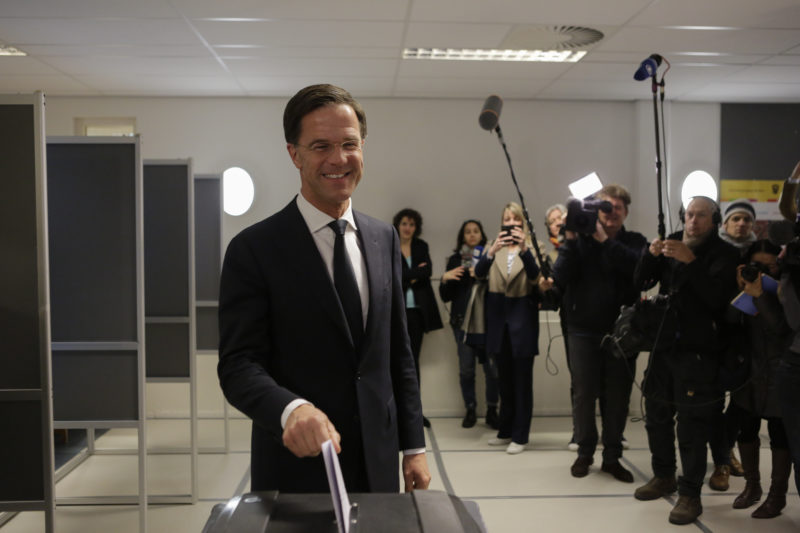Geert Wilders Didn’t Win – But He Has Reshaped Dutch Politics
Rose Asani, Spectator, March 16, 2017
If the 2017 Dutch election was seen as a bellwether for populism in Europe, the verdict is still out. Mark Rutte’s liberal VVD may have come out on top, but it was a limping victory. One which saw the party lose around a quarter of its seats and radically shift its position over immigration.

March 15, 2017 – The Hague, South Holland, Netherlands – Mark Rutte puts his ballot paper into the ballot box. (Credit Image: © Michael Debets/Pacific Press via ZUMA Wire)
Just a year ago Rutte stood firm that immigrants were welcome in his country. But as the winds seemed to favour the anti-immigration stance of far-right parties, his rhetoric changed. ‘Act normal or go away,’ he said recently. It was in response to growing concerns that immigrants arriving in the Netherlands were not yet integrating.
The main advocate of stemming immigration is the man most of the international press focused on in the lead up to this election, Geert Wilders. The campaign of his party, the PVV, was summed up in a one-page manifesto. It said it would ‘Close Mosques, ban the Koran and halt immigration from predominantly Muslim countries’. Views which have resonated with the Dutch public.
This is not a new platform for Wilders. He in fact left the liberal VVD in the early 2000’s after a disagreement over immigration. Since the forming of the PVV, this has been its main goal: to bring the debate over immigration into the forefront of politics. The migrant crisis in 2015 – when thousands of people marched across Europe from the Middle East – only sharpened Wilders’ argument. The Netherlands, like Germany, Sweden and Denmark, opened its arms to people fleeing conflict. It offered shelter, food, support. But the generosity of the Dutch government also provoked tensions.
‘They get a nice home and money to buy furniture, when pensioners, Dutch pensioners, are struggling,’ one woman told me. That’s something I heard time and time again on the campaign trail. Other views echoed the more recent stance of Rutte. ‘We are a tolerant nation, but Islam is intolerant,’ they said. They don’t integrate,’ was another common response to the debate about Islam, pushed by Wilders.
Wilders has been described by many in the media as ‘racist’ but most people I’ve spoken to in the Netherlands see him as just ‘saying what the majority of people think’. Even those who told me they despised Wilders defended his right to air his views. A lot even agreed there was a problem with integration and those who couldn’t assimilate, shouldn’t come here.
In the end the PVV didn’t make the resounding gains the polls suggested it would. Just hours before voting booths closed, Wilders himself was still guarded. ‘The people will decide, it’s up to them to make us strong, if they don’t that is democracy’, he told me. After the result he claimed it as a victory, saying his party went into the elections as the third largest party, now it was second. And he’s not giving up the fight yet. Next, he says, it will be first.
EU leaders are claiming this result is a vote against ‘extremism’ and have loudly congratulated Rutte on his ‘win’. They are for now breathing a sigh of relief that Wilders didn’t take the 30-odd seats some predicted. They are also hoping populism is on the wane ahead of a crucial election in France this year. But in truth while Wilders didn’t make the gains he hoped for, he has increased his share of the vote and now has more seats. He will be the largest voice of opposition to Rutte’s new coalition government and he will continue to shape the political sphere.















